
At times we are compensated for the links you click at no cost to you. Learn more about why you should trust our reviews and view our disclosure page.
You may have a point if you’re blaming a bad pillow for neck and back pain. Will ditching the pillow altogether solve the problem? There may be several sleep health issues associated with sleeping without a pillow. We’ve researched the pros and cons of sleeping without head support and whether it can provide any health benefits.
Is Sleeping Without a Pillow Bad? Potential Downsides
The purpose of a pillow is to fill the gap between your head and sleep surface and provide support to your head. The best pillows align your spine properly (this is how anti-snore pillows work).
Without a pillow, your neck will remain curved throughout the night, and neck muscles will be unevenly pressured in almost all sleep positions, so neck and shoulder pain, stiffness, and headaches are more likely to occur. In a lot of situations, the muscles of one side of the neck will be over-extended, and on the other side, contracted. This creates unevenness in how you keep your neck for a big part of the night.
Sleeping without a pillow arrangement for an extended period increases the chance of back, shoulder, and neck pain and may cause breathing disorders during sleep.
Here’s a quick overview to determine which type of pillow is suitable for which sleeping position, just to give you an idea of why pillows are important in the first place.
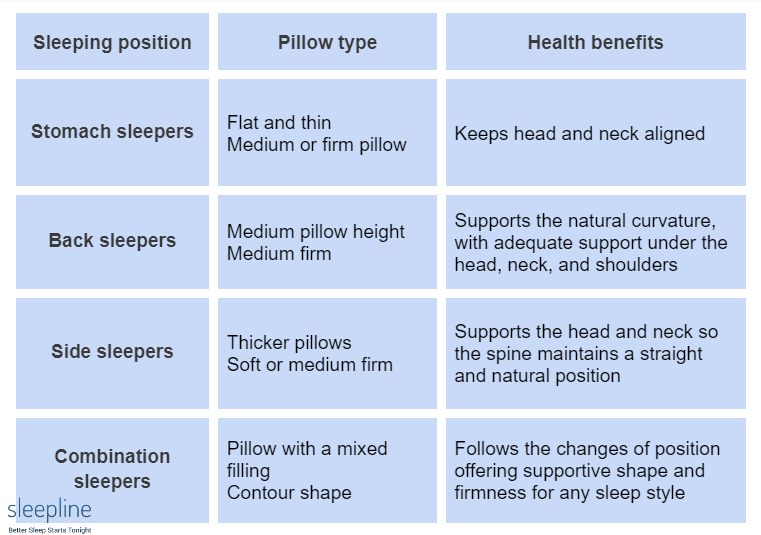
Back pain
Back pain is one of the most common health problems, and in the USA, it is one of the most common reasons for absence from work.
Incorrect posture and bad body position during sleep definitely create and aggravate the pain, even though they aren’t the only reason you might be suffering from back pain.
Sleeping without a pillow may strain back muscles and put pressure on spinal ligaments. The absence of a pillow, especially for side or back sleepers, may speed up the development of osteochondrosis of the cervical spine.
Every back injury is unique, so it is wise to be careful. You should consult a specialist before buying a pillow or deciding to ditch it in hopes of relieving back pain.
Poor spinal alignment
Due to not having a pillow, we might instinctively put our hands under our heads, which sometimes disables proper spinal alignment.
In all pillowless sleeping positions, our head eventually tends to fall or rotate left or right. Head movements stretch the neck muscles into an unnatural position and curve the upper spine, which in the worst-case scenario could even become deformed over time.
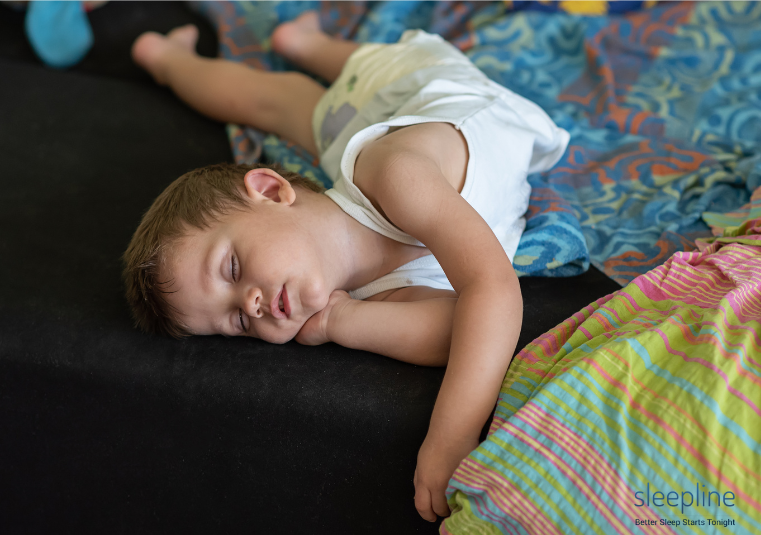
Neck pain
Generally, people who sleep on their sides (and, somewhat less commonly, backs) will experience neck pain if they do not use a pillow. Sleeping on your side pillowless can cause your neck to overextend. You’ll get uncomfortable if your neck is bent in any way for a long time.
Pillowless sleep is the most acceptable for stomach sleepers. But even their neck eventually gets in a position that results in additional pressure on the neck itself. Pillows for stomach sleepers are usually very flat to provide some, but not too much support.
Shoulder pain
Keeping your neck curve supported and aligned with the shoulders is crucial. Sleeping without a pillow on the side is likely to cause shoulder pain because there’s no head support and the additional weight of your head and neck is placed on your shoulder. And it’s not only mere pressure, but your shoulder is likely to get into unnatural positions, curved up to the front or extended to the back.
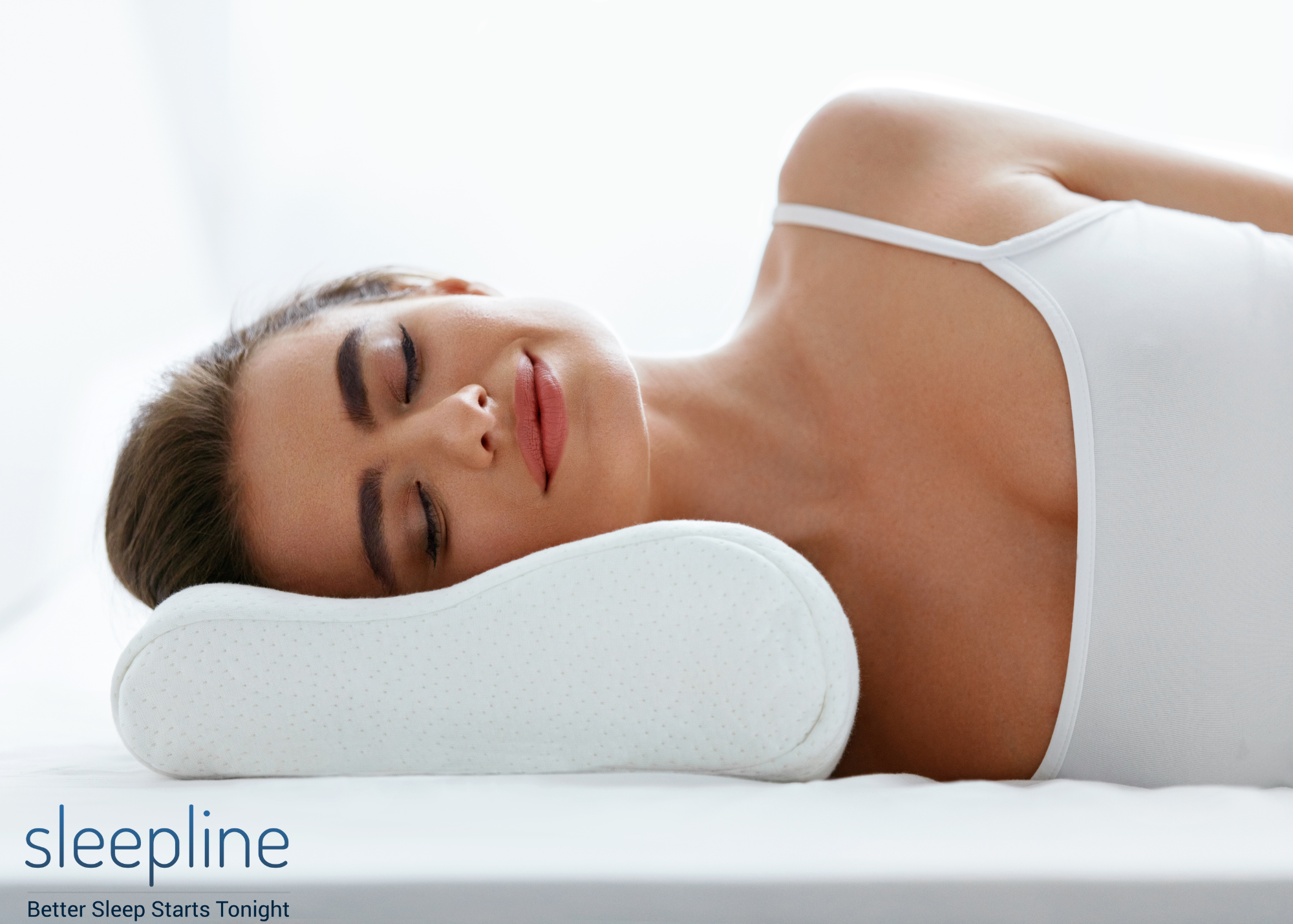
Sleep apnea and breathing problems
When you suffer from sleep apnea, you cease breathing in your sleep, usually due to your airways getting physically obstructed and you might wake up several times at night as you gasp for air.
If you have nasal deviations, blocked airways, or sleep apnea, it is recommended that you sleep on your back and that your head is raised with firm memory foam or wedge pillow about thirty degrees from the rest of the body.
If you treat sleep apnea with continuous positive airway pressure (CPAP) therapy, pillows may interfere. If you sleep on your side, the pillow can knock off the mask that pushes air through your airways.
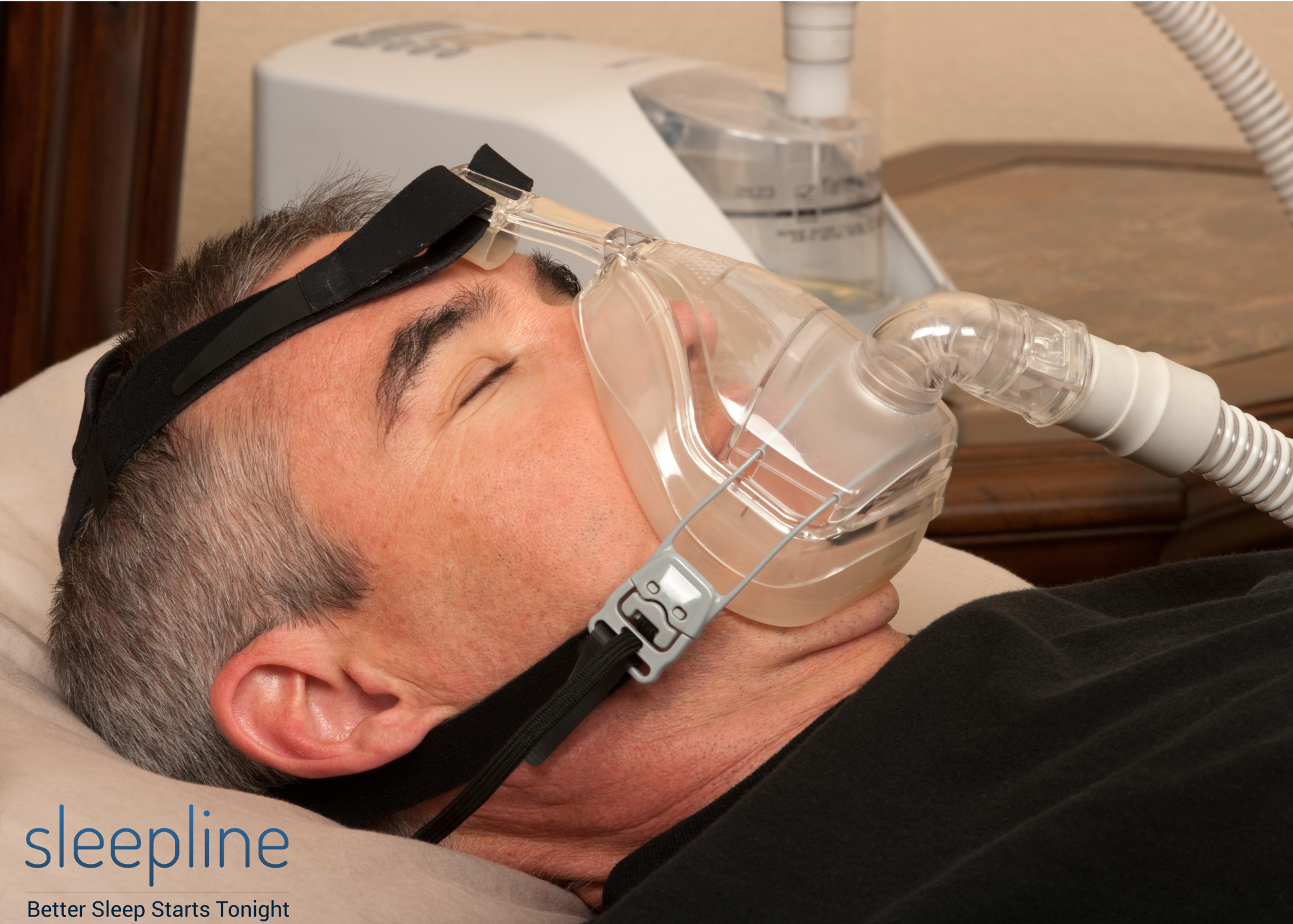
Benefits of Sleeping With No Pillow
Stomach sleepers are the only ones who can benefit from sleeping without a pillow. But even for them, the comfort is questionable. Correct posture can be achieved without a pillow and on the stomach only when the sleeper is in good body shape, not hunched, and has a flat stomach with strong muscles.
Reduced neck tension
Despite limited research, anecdotal reports suggest that sleeping without a pillow reduces neck pain. Reduced neck tension comes as a result of the neck being at a lower angle because the head isn’t raised up on a pillow.
But this could only work for stomach sleepers, not for anyone else. In fact, other sleep positions can cause more neck tension if you don’t use a pillow.
Better spinal alignment for stomach sleepers
In the case of stomach sleepers, a very thin pillow, or none at all, can help level the head and neck with the rest of the spine. As a result, the neck and spine will be in a more natural alignment and this can remove strain from your shoulders, neck, and keep the spine in the correct position.
Hair and skin health
There are certain assumptions that some materials have a better or worse effect in absorbing hair and skin oil, but this isn’t connected to the question of having a pillow or not, but rather to the bedding materials.
Since our hair and skin come into contact with the pillowcase and sheets first, many people consider silk pillowcases to be a better material than cotton ones. This is because cotton can soak up more than silk, so it extracts the skin oils and moisture, and together with more friction, it can leave your skin flaky and your hair dull. When you use a silk pillow, there’s very little friction and your skin and hair aren’t deprived of their natural oils.
Also, some research in the early stages claims that there is a connection between wrinkle formation and sleep position. They believe that sleep wrinkles will show up sooner if you sleep with your head stuffed into a pillow, and this makes a lot of sense because when your face is free from pressure, new wrinkles won’t form as easily. Pillows like Night Pillow are designed specifically to reduce the effects of aging. However, which one of us can guarantee that we won’t be stuffing our face into the mattress and still cause wrinkles?
Types of People Who Shouldn’t Sleep Without a Pillow
Only stomach sleepers can ditch pillows and have some benefits from it. Sleeping pillowless on the stomach can keep their neck and spine aligned.
For everyone else, sleeping without any kind of head and neck support may lead to the most unhealthy sleep positions.
People with acne or sensitive skin shouldn’t avoid pillows altogether but they should try not to sleep with their faces in or directly on the pillow. Back sleeping is a good choice since the buildup of oil and sweat on pillowcases can be a breeding soil for bacteria.
People with spinal conditions
People with scoliosis are usually strongly discouraged from sleeping without a pillow because this can worsen their condition. The same goes for those who suffer from kyphosis or have a dowager’s hump.
The latter often need specially made cervical pillows to be placed under the neck so that the back of the head can drop back and provide a spinal position that would counter their condition and hopefully improve it. People with scoliosis need tall pillows if they sleep on the side, to ensure they won’t be making more of the side curvature of their spines.
Side sleepers
Side sleepers have a space between their necks and shoulders. Without a pillow, that space isn’t supported, and the neck can fall and get uneven. That’s why side sleepers benefit from a thick pillow.
Also, it is almost impossible for a side sleeper to maintain neutral spine alignment if their neck doesn’t have the right pillow to rest on.
Back sleepers
Without a pillow back sleepers will often find themselves in the morning with their chin going up too much. This means that their neck is curved in the same way as when they are hunched over a computer. This awkward position for people with spinal conditions like scoliosis could increase the level of back pain. That’s why they need a thin pillow beneath the head to keep their chin tucked in just a bit and their neck in the correct position.
Back sleepers should place a thin pillow underneath their knees which will align their upper body and also help to support the lower back.
Steps For Properly Sleeping With No Pillow
If you want to put the pillow out of use, it is important not to do it suddenly. Before you start sleeping without a pillow, try to gradually reduce the height of the pillow until you no longer need it.
Start with a thin pillow to ease into it
- Reduce the pillow height. Start with a thinner pillow and after a short time, substitute it with a folded blanket or rolled towel.
- After a week or two, reduce the height again. If you were using a blanket folded three times, reduce the folds to two.
- Again after a week or two, go from two folds to a single fold.
- Try sleeping without a pillow.
- Be persistent in your intention to discard the pillow. Increasing the height will return you to old sleeping habits.
Use a body pillow for extra support
A body pillow is an oversized pillow designed to cradle your entire body. They are made in different sizes and with various fillings so they meet the various demands of many sleepers.
Also, a body pillow is a common term for pillows smaller in size. These pillows target different parts of the body, such as the lower back, hips, and knees.
A body pillow should encourage you to get more comfortable in the sleeping position that best suits you.
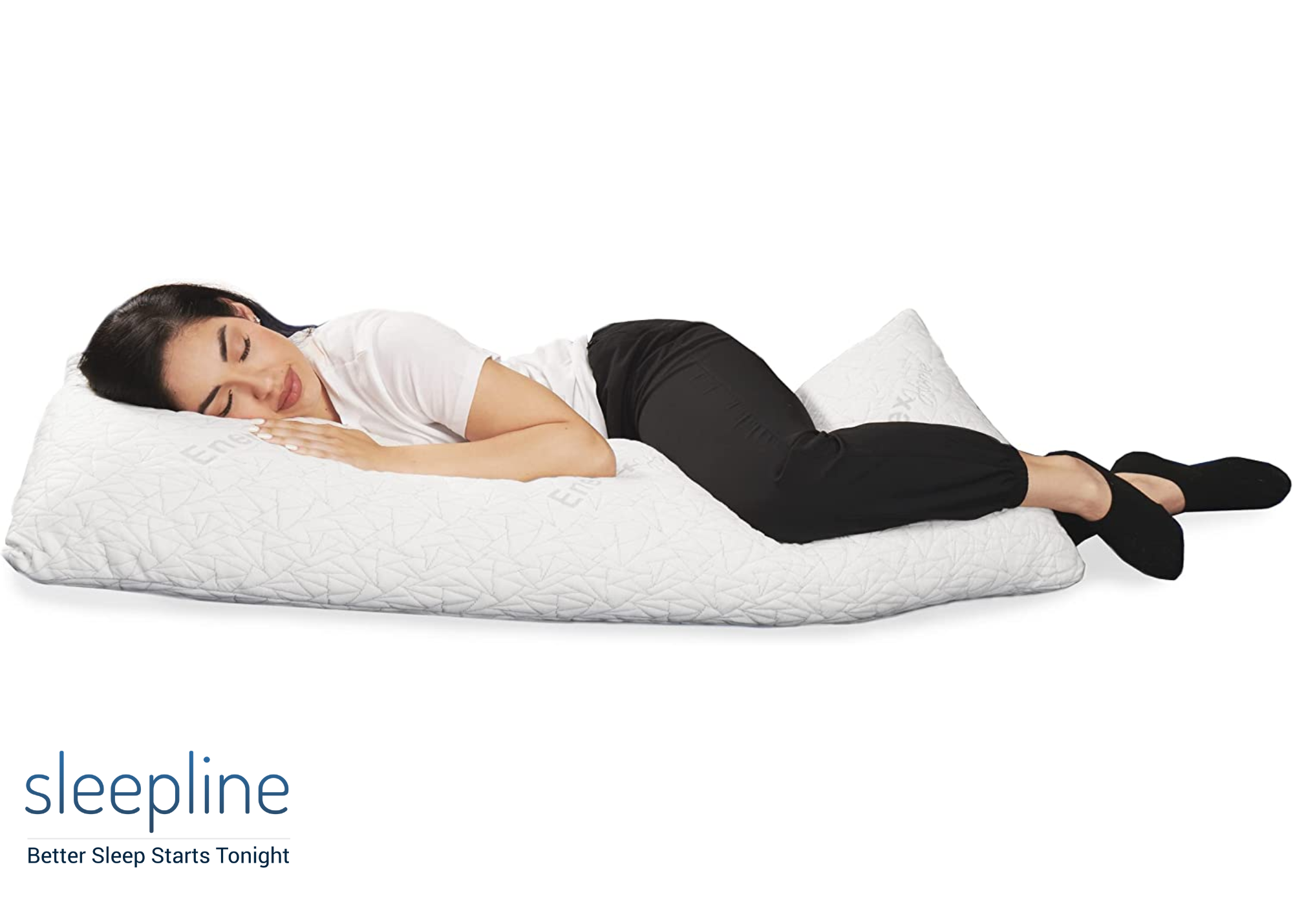
Get a more supportive mattress
Having the right mattress is necessary to keep your body balanced and supported, so if you sleep on the back or stomach, a firm memory foam mattress may help you to gain a better posture.
A somewhat softer mattress helps side sleepers and combination sleepers as foam distributes body weight evenly and allows the upper body to sink along with the hips and shoulders.
FAQS
Most people need one or more pillows to achieve their desired comfort. A pillow is strongly recommended for side and back sleepers. Sleeping without a pillow may be unsafe if you suffer from neck or back pain or have breathing problems or suffer from gastroesophageal reflux disease (GERD).
The absence of a pillow will likely negatively affect sleep posture for most sleepers. Most sleepers can experience neck or back pain due to the uncomfortable posture of the head and neck when lying on a flat surface.
If you suffer from spinal conditions, no pillow might aggravate them. Rarely, for a healthy person who sleeps on a firm surface and on the back, going pillowless could lead to a better posture. However, for most people who spend their entire lives with comfy pillows, this would actually be detrimental.
Conclusion
Sleeping without the right pillow is not a wise decision for most side and back sleepers because of poor posture, which results in many annoying health issues. Only stomach sleepers can experience some benefits if they don’t use a pillow. In almost all sleeping positions, head and body pillows are more than necessary to ensure the alignment of the neck and spine in a neutral position that is the least stressful for muscles, ligaments, and soft tissues.
Those who do want to go pillowless should do so gradually and carefully. Your facial skin might look better without a pillow but this has more to do with materials and the cleanliness of sheets.
Next step: Read our Nuzzle Pillow review. My Nuzzle is one of the most popular pillows in the world. Is it really worth buying or is it just a gimmick? Find out in our in-depth review.
- Why is it illegal to remove a mattress tag? (what the penalty is) - July 7, 2025
- Best mattresses for kids (top 5 picks) - January 14, 2025
- Best 12-inch mattress – data-backed performance tests on 11+ brands - January 24, 2024
Psst… the sleep review industry is full of liars, sharks, and thieves. It’s a modern-day version of getting ripped off at your local mattress store. So, why should you trust us?

